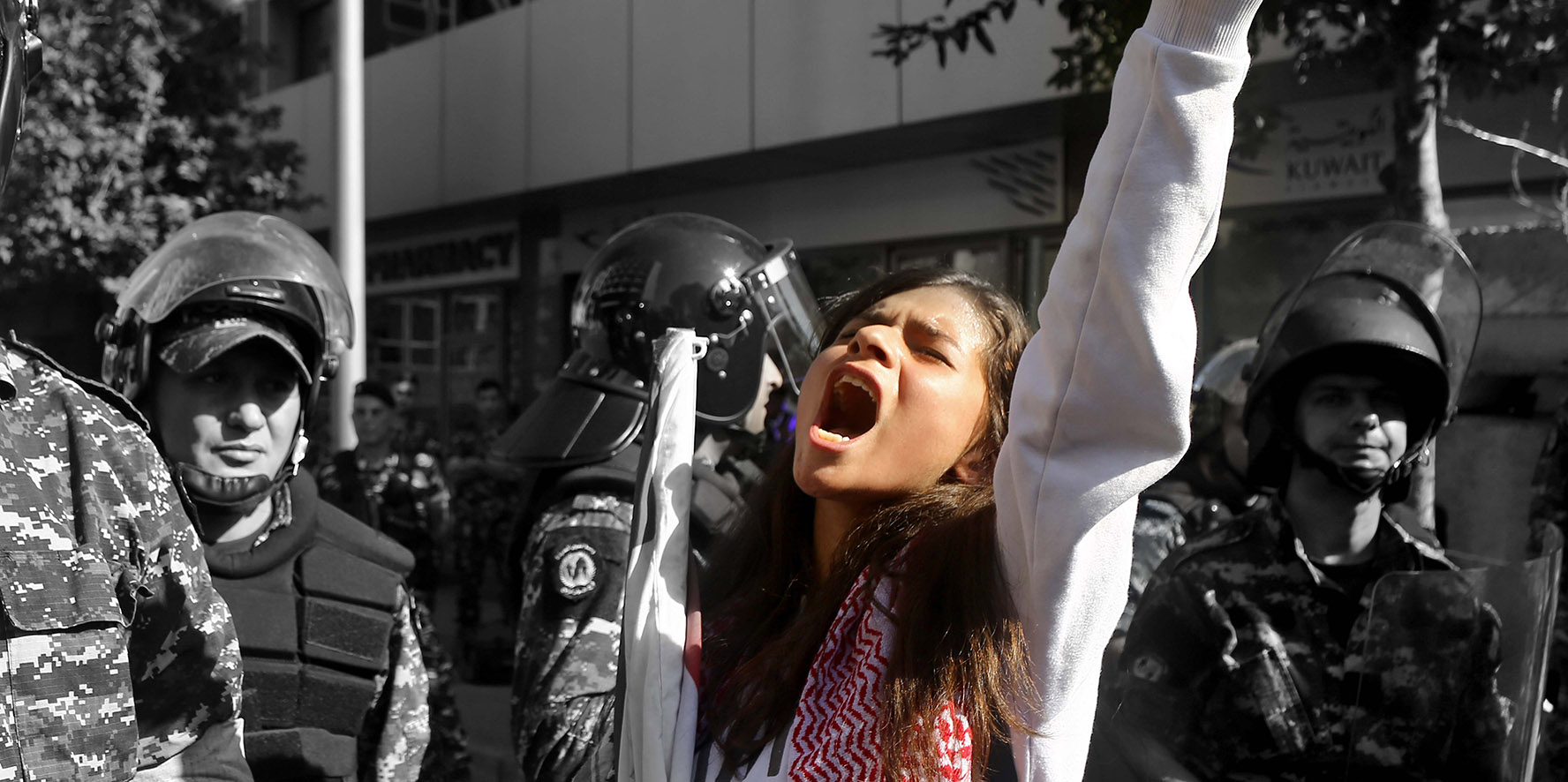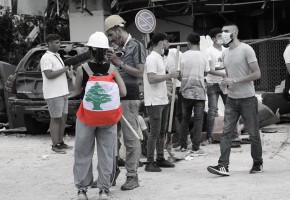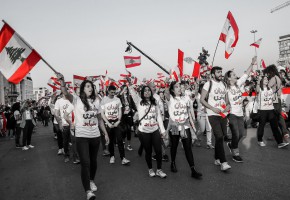
The Battle of Women in the Political Transformations in Lebanon - Joelle Abdel Aal
The Battle of Women in the Political Transformations in Lebanon - Joelle Abdel Aal
Between the barricades of "West Beirut" and "East Beirut" she was running, hiding behind the walls from sniper bullets, in order to reach her sister's house and return with her and her children to her family's house. Another stood up to weapons and militias, trying to protect her son from them, preventing him from being kidnapped and taken to an unknown place, enduring long nights away from him at home, cursing his kidnappers while he was in the militias’ detention, being whipped and tortured. One of them held the hands of her young children and went from street to street looking for her missing husband. Hence, Wadad Halawani's call and the march she called for turned out to be the first time that women took to the streets to protest against the war.
All of these stories were told by women who were heroines and pioneers, even if no history was written about some of them, but the civil war put women in transformative circumstances and changed their roles, where women became peacemakers during the civil war, contributing to breaking the barricades of war and filling the sectarian gap that was instilled and reinforced by war makers, leaders, sponsors and political stakeholders. Although her role in participating in peace negotiations and reconstruction was excluded due to patriarchy and the post-war patrilineal system, she insisted on seizing her leadership role despite losing so much.
History... has not done justice to women
The history books have only told the victories of men and their battles and wars, but they have only mentioned women as widows. This deliberate marginalization of women is nothing but evidence of the patrilineal patriarchal system that the Lebanese political system wanted since its establishment, and which was enshrined in the Lebanese educational curriculum and not only in History books, which excluded an entire era from the history of Lebanon and carefully studied its patriarchal system since the Taif Agreement.
The history books did not mention women, but the memory of women was stronger and more capable of carrying this history deep down. Our grandparents and our parents often told us about the agony of the war they have been through, they told us about women who were raped by war militias, others who were sold to influential men, they told us as well about a woman who killed her daughters and herself so that they would not be raped or abused amid the brutality of the civil war. This history has existed only in the memory of women who have been excluded or marginalized by obscuring the discrimination, exclusion and exploitation women faced during the war, in order to issue the Amnesty Law and ending the war without holding the perpetrators accountable and to cover up their crimes.
The October uprising as a restoration of the social and political role of women
The history of women’s struggle is long in Lebanon before the October 17, 2019 uprising, but history did not want to mention this struggle for fear of the existing political system in Lebanon; it summarized and reduced the memory of the war from the perspective of the man, brother, father and leader. Sectarianism, which was the main and primary cause of the outbreak of the civil war, continues to this day, and its repercussions and effects continue as well, as it has enshrined the sectarian system, which has thus allowed the religious authorities to control women’s issues and enshrine unjust policies against them, robbing them of the right to a unified Civil Personal Status Law, thereby promoting the violation of women's rights at all levels.
With the start of the October uprising, women reorganized, even if the main media, which is an extension of the ruling authority, tried to stereotype them as the peaceful and beautiful face of the uprising, or tried to fight the demanding movements by describing the protesters as “whores” by the media, politicians or even people with social influence. The defamation of women’s image was nothing but a political agenda that serves the patriarchal authority and the existing sectarian system that has robbed women and girls of many of their rights in the absence of a unified Civil Personal Status Law, however the true image that was hidden from public opinion, only women who were in the squares know it well.
Women were at the forefront of the October 17 uprising, and they were the most conscious of their demands at all levels; they had clear slogans and demands, they were organized and they insisted on taking their rights from the sectarian authorities and the patriarchal system. The October 17 uprising showed women's issues and brought them closer to public opinion, which is able to understand the issues from a rights viewpoint rather than from the approach of a sectarian political system that is conservative on such rights, under the traditional justifications and patrilineal domination. Furthermore, the term feminism has emerged with a new concept for a large number of public opinion, so that the meaning of feminism has become clear, with its social and political movements as well as ideologies aimed at defining and establishing political, economic, personal and social equality not only between the sexes but between the various groups of society.
Women have imposed their political position in the October 17 uprising, creating their rights platform and confronting the violence of the security forces, supporters of the Lebanese parties that confronted the protestors in all Lebanese regions. It is remarkable that, despite all forms of stereotyping the role of women in areas far from the city of Beirut, the role of women was prominent therein, as women succeeded in breaking the barriers of fear and in confronting and revolting against patrilineal patriarchal systems and laws.
The October 17 uprising pushed women to organize their demanding movements, to be a human shield and to stand in the face of the Shabihas of political parties, holders of power and security forces, so that these practices would be a breakthrough in highlighting the role of women, and today we can seek this change on different levels. Baalbek, for example, witnessed the movement of a group of women about a month ago with the aim of holding the municipality accountable and demanding the area's basic rights. As for Tripoli, social media buzzed with cases of sexual harassment of a number of female students by professors. Exposing the name of the harassing professor, and the protests in front of the school and the pressure on the school’s principal have produced achievements and changes that were not anticipated, until the process of exposing the harassing professors followed in Tripoli, which was like breaking the patrilineal system and revolting on the patriarchal society.
If, over the years and decades, history has deliberately erased the role of women from its memory in order to serve the interests of the existing political system, women, through their movements and organization, were able to redraw the memory of history and create their organized spaces to take their rights from the authority of tyrannical sects and the existing patrilineal patriarchal system, and here they are today, seeking to create a safe space for dialogue and to be partners in resolving conflicts, and to interpret the beliefs that impede them from exercising their political and social role despite all obstacles and challenges.
Joelle Abdel Aal
Recent publications

ANND Newsletter January 2026 - From Davos to the UPR: Between Promises, and Accountability
Related publications


